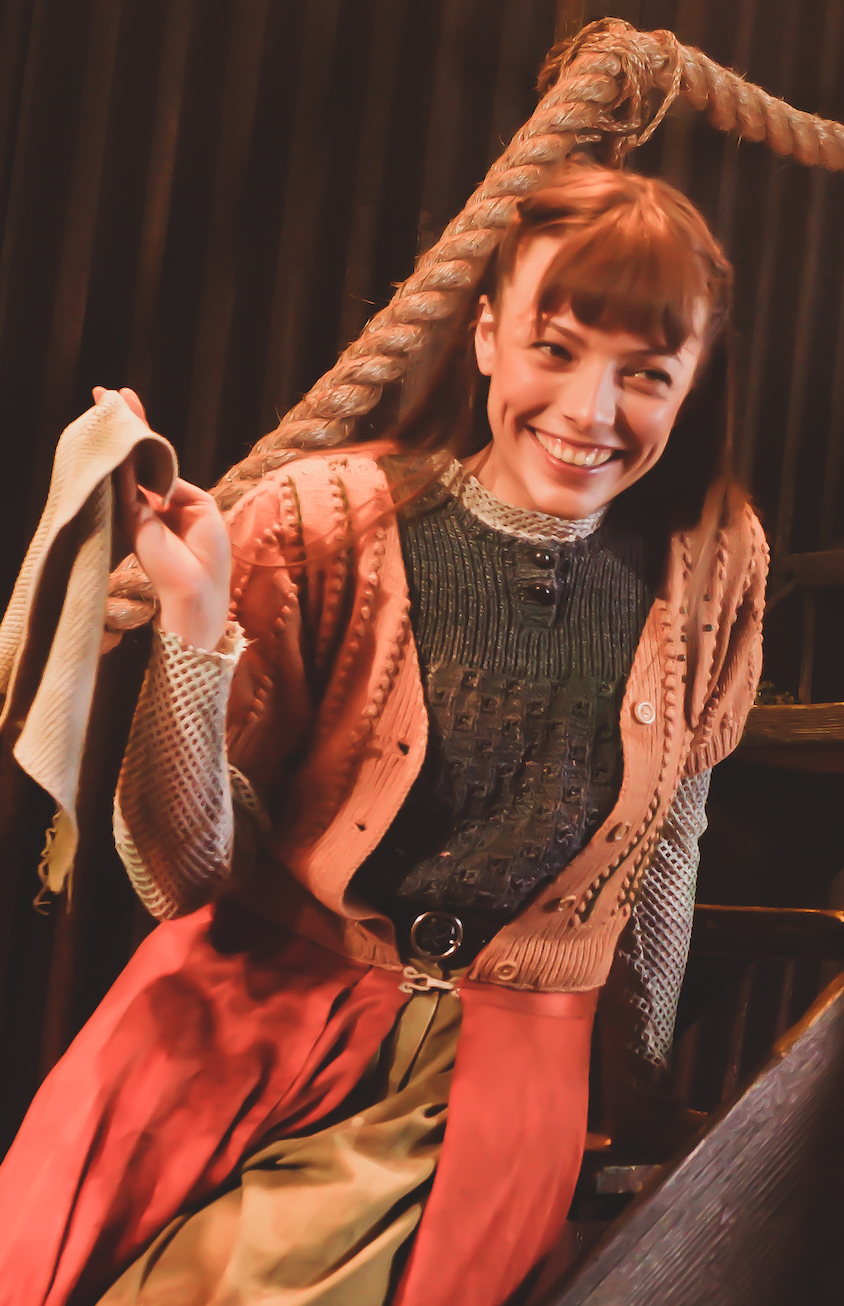The Curious Case of Benjamin Button, Southwark Playhouse Elephant review - superbly performed folksy musical | reviews, news & interviews
The Curious Case of Benjamin Button, Southwark Playhouse Elephant review - superbly performed folksy musical
The Curious Case of Benjamin Button, Southwark Playhouse Elephant review - superbly performed folksy musical
A winning ensemble led by Jamie Parker deliver a refreshing piece

The short story F Scott Fitzgerald wrote as a challenge, of a man born 70 years old whose body gets younger as the years pass, has already been blown up into a lengthy film of the same name starring Brad Pitt (and lots of CGI). Jethro Compton decided a bare-bones musical for six multi-instrumentalists and no special effects was what it needed to be, and how well it works.
Four years on, for its second run at Southwark Playhouse, Compton is directing a cast that has ballooned to 12, who ably accompany themselves on a wide range of instruments (brass, wind, strings, keyboards, percussion) as they sing, dance and act. For me, it’s the best use of this style since the glory days of John Doyle’s Sweeney Todd and other musicals at the Watermill. It’s a wonderful sight to see cellos, double basses and a French horn being danced around the stage, alongside more predictable guitars, fiddles, flute and whistles. And these are all first-rate musicians.
The stage has wooden steps leading down to it on each side, and traps through which the cast first appear or stow costumes; the only scenery is provided by a half-dozen stackable wooden crates. We are in Compton’s native north Cornwall, where dangerous tin mining is still being pursued. Without CGI, the onus on the actor playing Benjamin is huge. Fortunately, the production has Jamie Parker to hand, the first-cast History Boy who went on to win an Olivier as the stage Harry Potter. Parker immediately morphs from chorus member into a stooped old man demanding his pipe on the day he is born in 1918, then marks the phases of Benjamin’s life – a genial but shy middle-aged-looking man 20 years on, a sage soldier on D-day, a fervent young lover in his biological fifties, a boyish father to his own son, then an empty shawl when he dies in 1988 – with no change of costume or makeup. It’s a tour de force.
Without CGI, the onus on the actor playing Benjamin is huge. Fortunately, the production has Jamie Parker to hand, the first-cast History Boy who went on to win an Olivier as the stage Harry Potter. Parker immediately morphs from chorus member into a stooped old man demanding his pipe on the day he is born in 1918, then marks the phases of Benjamin’s life – a genial but shy middle-aged-looking man 20 years on, a sage soldier on D-day, a fervent young lover in his biological fifties, a boyish father to his own son, then an empty shawl when he dies in 1988 – with no change of costume or makeup. It’s a tour de force.
The plot is announced by the cast, who have an obsession with numbers, specifically the total minutes, weeks, months, et al that have passed between the last scene and the current one: an all-singing, all-dancing timeline. They swap in and out of roles at the drop of a fiddle (even Parker plays, amusingly, an extra role, the infamous village vamp, Mrs Gladstone’s Sister), so the action is always on the move. It’s basically a quirky tale with satisfying paradoxes, peppered with cute remarks to Benjamin that he should follow his dream, he isn’t getting any younger, except of course he is. HIs rejection by his parents and his community is the lot of the misfit, destined to wander in search of "home".
 Darren Clark’s score is a rich blend of folk, nu-folk and sea shanty; some of the most beautiful passages are sung a cappella, and one is delivered entirely in Cornish. A recurring song, “Matter of Time”, punches home the show’s big theme: that the number of years in a life are no measure of its worth.
Darren Clark’s score is a rich blend of folk, nu-folk and sea shanty; some of the most beautiful passages are sung a cappella, and one is delivered entirely in Cornish. A recurring song, “Matter of Time”, punches home the show’s big theme: that the number of years in a life are no measure of its worth.
It’s here the show’s tone could head towards the more syrupy stuff of bestselling novels about love, life and reality – the poignancy of missed chances, lost loves and unfulfilled dreams. The chorus have their faces set against sentimentality, though, literally: they come on with big grins and mostly leave them there, only changing expression when called on to play a character. There is a heady air of happy musicianship about them, a relentless jolliness and overt camaraderie as they tell their odd tale. I found them a bit too “up” at times and wished they could be a more distanced chorus, commenting without prodding the audience with their cheeriness. But that’s a matter of taste. When events onstage grow sad, there is no lack of appropriate emotion; indeed, things turn remarkably tear-jerking.
At the centre of these emotional elements is the Elowyn of Molly Osborne (pictured above), another terrific performance. The barmaid at the Pickled Crab pub, Elowyn is “the only woman Benjamin will ever love”, we are told by the chorus from the off, and Osborne proves worthy of his affections, a very natural performer with a pure folk voice. Their love affair is tender and affecting.
The show’s programme lists the heavy-hitting producers behind this project, presumably a sign that a West End transfer is in its sights. It should get one, especially now that Come from Away has moved out. Its gorgeous folk-based music is a refreshing alternative to the increasingly homogenous, mid-Atlantic sound of new “big” musicals. Like Operation Mincemeat, its roots are local; and like that show it has a cast equal to any that bigger West End productions currently have to offer.
rating
Explore topics
Share this article
The future of Arts Journalism
You can stop theartsdesk.com closing!
We urgently need financing to survive. Our fundraising drive has thus far raised £49,000 but we need to reach £100,000 or we will be forced to close. Please contribute here: https://gofund.me/c3f6033d
And if you can forward this information to anyone who might assist, we’d be grateful.

Subscribe to theartsdesk.com
Thank you for continuing to read our work on theartsdesk.com. For unlimited access to every article in its entirety, including our archive of more than 15,000 pieces, we're asking for £5 per month or £40 per year. We feel it's a very good deal, and hope you do too.
To take a subscription now simply click here.
And if you're looking for that extra gift for a friend or family member, why not treat them to a theartsdesk.com gift subscription?
more Theatre
 Troilus and Cressida, Globe Theatre review - a 'problem play' with added problems
Raucous and carnivalesque, but also ugly and incomprehensible
Troilus and Cressida, Globe Theatre review - a 'problem play' with added problems
Raucous and carnivalesque, but also ugly and incomprehensible
 Clarkston, Trafalgar Theatre review - two lads on a road to nowhere
Netflix star, Joe Locke, is the selling point of a production that needs one
Clarkston, Trafalgar Theatre review - two lads on a road to nowhere
Netflix star, Joe Locke, is the selling point of a production that needs one
 Ghost Stories, Peacock Theatre review - spirited staging but short on scares
Impressive spectacle saves an ageing show in an unsuitable venue
Ghost Stories, Peacock Theatre review - spirited staging but short on scares
Impressive spectacle saves an ageing show in an unsuitable venue
 Hamlet, National Theatre review - turning tragedy to comedy is no joke
Hiran Abeyeskera’s childlike prince falls flat in a mixed production
Hamlet, National Theatre review - turning tragedy to comedy is no joke
Hiran Abeyeskera’s childlike prince falls flat in a mixed production
 Rohtko, Barbican review - postmodern meditation on fake and authentic art is less than the sum of its parts
Łukasz Twarkowski's production dazzles without illuminating
Rohtko, Barbican review - postmodern meditation on fake and authentic art is less than the sum of its parts
Łukasz Twarkowski's production dazzles without illuminating
 Lee, Park Theatre review - Lee Krasner looks back on her life as an artist
Informative and interesting, the play's format limits its potential
Lee, Park Theatre review - Lee Krasner looks back on her life as an artist
Informative and interesting, the play's format limits its potential
 Measure for Measure, RSC, Stratford review - 'problem play' has no problem with relevance
Shakespeare, in this adaptation, is at his most perceptive
Measure for Measure, RSC, Stratford review - 'problem play' has no problem with relevance
Shakespeare, in this adaptation, is at his most perceptive
 The Importance of Being Earnest, Noël Coward Theatre review - dazzling and delightful queer fest
West End transfer of National Theatre hit stars Stephen Fry and Olly Alexander
The Importance of Being Earnest, Noël Coward Theatre review - dazzling and delightful queer fest
West End transfer of National Theatre hit stars Stephen Fry and Olly Alexander
 Get Down Tonight, Charing Cross Theatre review - glitz and hits from the 70s
If you love the songs of KC and the Sunshine Band, Please Do Go!
Get Down Tonight, Charing Cross Theatre review - glitz and hits from the 70s
If you love the songs of KC and the Sunshine Band, Please Do Go!
 Punch, Apollo Theatre review - powerful play about the strength of redemption
James Graham's play transfixes the audience at every stage
Punch, Apollo Theatre review - powerful play about the strength of redemption
James Graham's play transfixes the audience at every stage
 The Billionaire Inside Your Head, Hampstead Theatre review - a map of a man with OCD
Will Lord's promising debut burdens a fine cast with too much dialogue
The Billionaire Inside Your Head, Hampstead Theatre review - a map of a man with OCD
Will Lord's promising debut burdens a fine cast with too much dialogue

Add comment